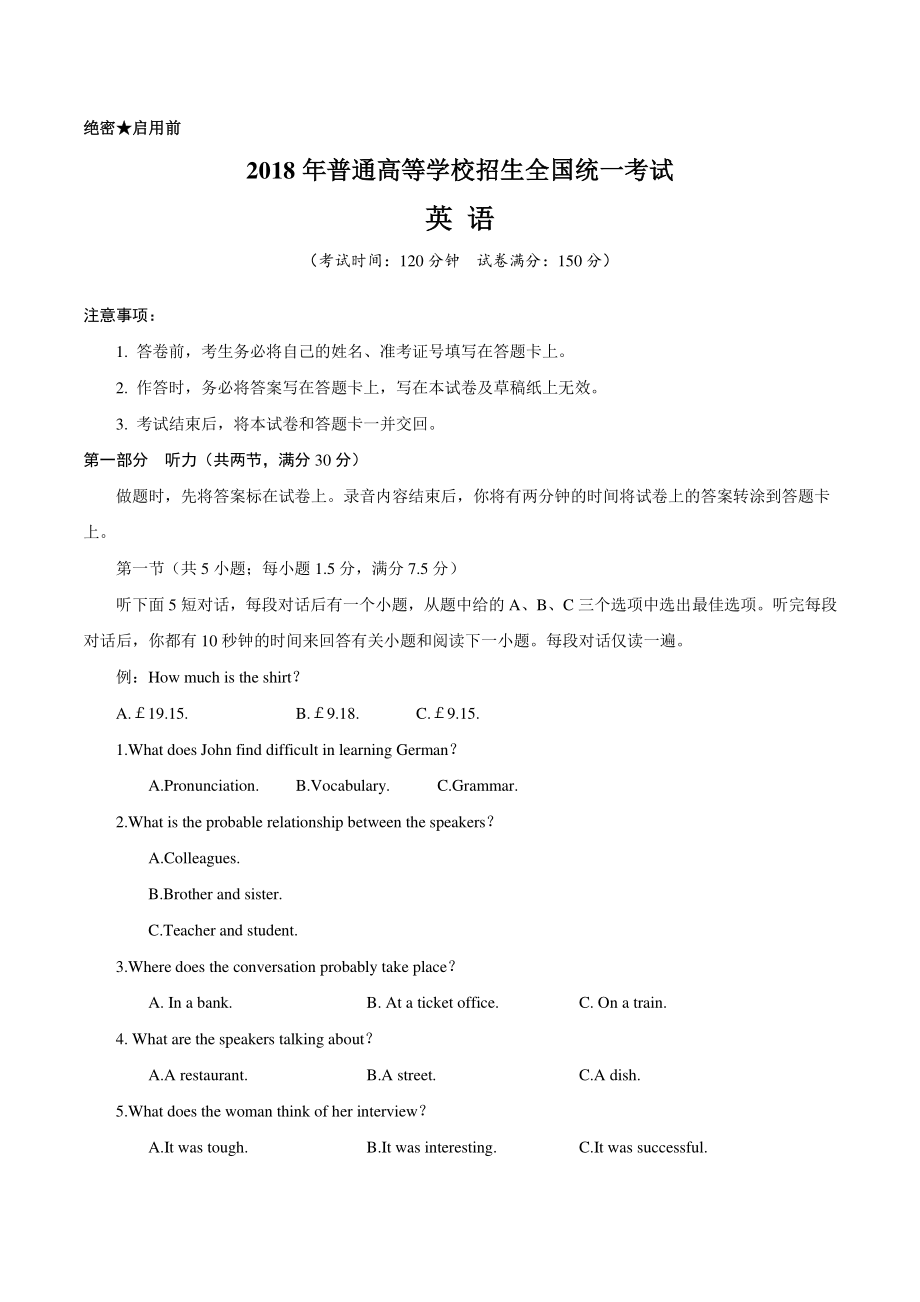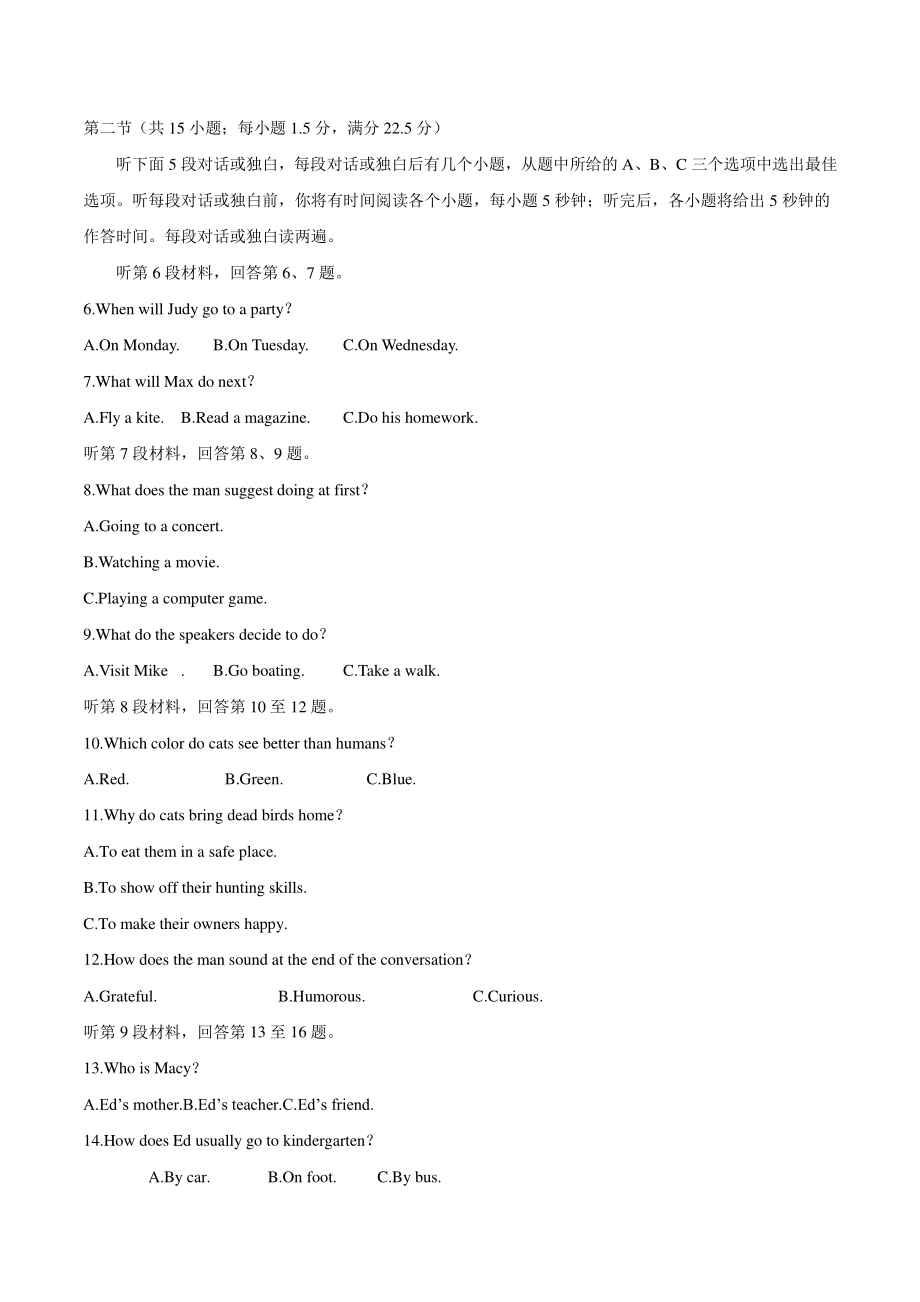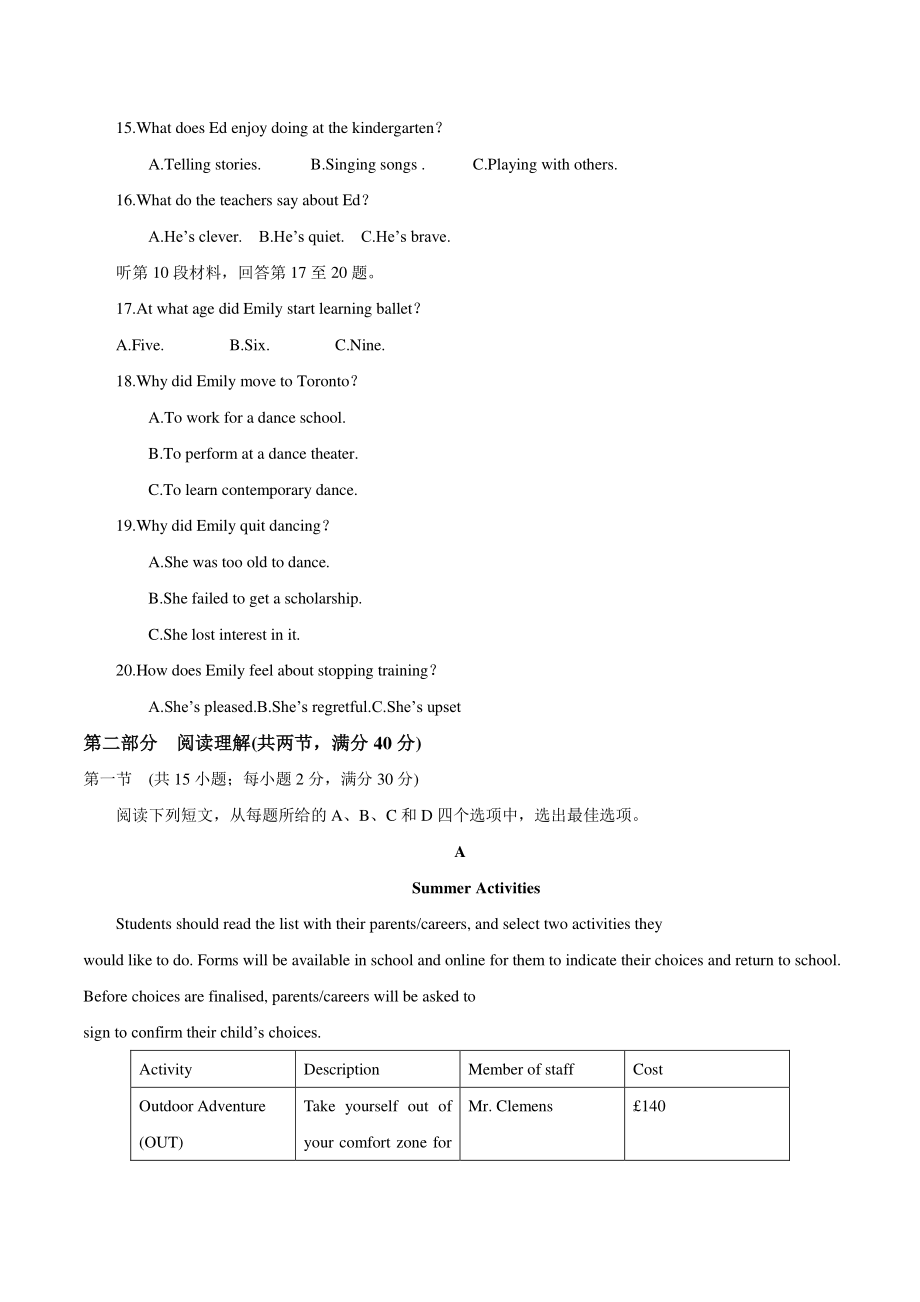 2018年海南省高考英语试题(含答案)
2018年海南省高考英语试题(含答案)
《2018年海南省高考英语试题(含答案)》由会员分享,可在线阅读,更多相关《2018年海南省高考英语试题(含答案)(20页珍藏版)》请在七七文库上搜索。
1、绝密绝密启用前启用前 2018 年普通高等学校招生全国统一考试年普通高等学校招生全国统一考试 英英 语语 (考试时间:120 分钟 试卷满分:150 分) 注意事项: 1. 答卷前,考生务必将自己的姓名、准考证号填写在答题卡上。 2. 作答时,务必将答案写在答题卡上,写在本试卷及草稿纸上无效。 3. 考试结束后,将本试卷和答题卡一并交回。 第一部分 听力(共两节,满分 30 分) 做题时,先将答案标在试卷上。录音内容结束后,你将有两分钟的时间将试卷上的答案转涂到答题卡上。 第一节(共 5 小题;每小题 1.5 分,满分 7.5 分) 听下面 5 短对话,每段对话后有一个小题,从题中给的 A、B
2、、C 三个选项中选出最佳选项。听完每段对话后,你都有 10 秒钟的时间来回答有关小题和阅读下一小题。每段对话仅读一遍。 例:How much is the shirt? A.19.15. B.9.18. C.9.15. 1.What does John find difficult in learning German? A.Pronunciation. B.Vocabulary. C.Grammar. 2.What is the probable relationship between the speakers? A.Colleagues. B.Brother and sister. C.
3、Teacher and student. 3.Where does the conversation probably take place? A. In a bank. B. At a ticket office. C. On a train. 4. What are the speakers talking about? A.A restaurant. B.A street. C.A dish. 5.What does the woman think of her interview? A.It was tough. B.It was interesting. C.It was succe
4、ssful. 第二节(共 15 小题;每小题 1.5 分,满分 22.5 分) 听下面 5 段对话或独白,每段对话或独白后有几个小题,从题中所给的 A、B、C 三个选项中选出最佳选项。听每段对话或独白前,你将有时间阅读各个小题,每小题 5 秒钟;听完后,各小题将给出 5 秒钟的作答时间。每段对话或独白读两遍。 听第 6 段材料,回答第 6、7 题。 6.When will Judy go to a party? A.On Monday. B.On Tuesday. C.On Wednesday. 7.What will Max do next? A.Fly a kite. B.Read a m
5、agazine. C.Do his homework. 听第 7 段材料,回答第 8、9 题。 8.What does the man suggest doing at first? A.Going to a concert. B.Watching a movie. C.Playing a computer game. 9.What do the speakers decide to do? A.Visit Mike . B.Go boating. C.Take a walk. 听第 8 段材料,回答第 10 至 12 题。 10.Which color do cats see better
6、than humans? A.Red. B.Green. C.Blue. 11.Why do cats bring dead birds home? A.To eat them in a safe place. B.To show off their hunting skills. C.To make their owners happy. 12.How does the man sound at the end of the conversation? A.Grateful. B.Humorous. C.Curious. 听第 9 段材料,回答第 13 至 16 题。 13.Who is M
7、acy? A.Eds mother.B.Eds teacher.C.Eds friend. 14.How does Ed usually go to kindergarten? A.By car. B.On foot. C.By bus. 15.What does Ed enjoy doing at the kindergarten? A.Telling stories. B.Singing songs . C.Playing with others. 16.What do the teachers say about Ed? A.Hes clever. B.Hes quiet. C.Hes
8、brave. 听第 10 段材料,回答第 17 至 20 题。 17.At what age did Emily start learning ballet? A.Five. B.Six. C.Nine. 18.Why did Emily move to Toronto? A.To work for a dance school. B.To perform at a dance theater. C.To learn contemporary dance. 19.Why did Emily quit dancing? A.She was too old to dance. B.She fail
9、ed to get a scholarship. C.She lost interest in it. 20.How does Emily feel about stopping training? A.Shes pleased.B.Shes regretful.C.Shes upset 第二部分第二部分 阅读理解阅读理解(共两节,满分共两节,满分 40 分分) 第一节 (共 15 小题;每小题 2 分,满分 30 分) 阅读下列短文,从每题所给的 A、B、C 和 D 四个选项中,选出最佳选项。 A Summer Activities Students should read the list
10、 with their parents/careers, and select two activities they would like to do. Forms will be available in school and online for them to indicate their choices and return to school. Before choices are finalised, parents/careers will be asked to sign to confirm their childs choices. Activity Descriptio
11、n Member of staff Cost Outdoor Adventure (OUT) Take yourself out of your comfort zone for Mr. Clemens 140 a week, discover new personal qualities, and learn new skills. You will be able to take part in a number of activities from canoeing to wild camping on Dartmoor. Learn rock climbing and work as
12、a team, and enjoy the great outdoor environment. WWI Battlefields and Paris (WBP) On Monday we travel to London. After staying overnight in London, we travel on Day 2 to northern France to visit the World War I battlefields. On Day 3 we cross into Belgium. Thursday sees us make the short journey to
13、Paris where we will visit Disneyland Paris park, staying until late to see the parade and the fireworks. Our final Mrs. Milson 425 day, Friday, sees us visit central Paris and tour the main sights. Crafty Foxes (CRF) Four days of product design centred around textiles. Making lovely objects using re
14、cycled and made materials. Bags, cushions and decorations.Learn skills and leave with modern and unusual textiles. Mrs. Goode 30 Potty about Potter (POT) Visit Warner Bros Studio, shop stop to buy picnic, stay overnight in an approved Youth Hostel in Streatley-on -Thames, guided tour of Oxford to se
15、e the film locations, picnic lunch outside Oxfords Christchurch, boating on the River Cherwell through the University Miss Drake 150 Parks, before heading back to Exeter. 21.Which activity will you choose if you want to go camping? A.OUT. B.WBP. C.CRF. D.POT. 22.What will the students do on Tuesday
16、with Mrs. Wilson? A. Travel to London. B. See a parade and fireworks. C. Tour central Paris. D. Visit the WWI battlefields. 23.How long does Potty about Potter last? A. Two days. B. Four days. C. Five days. D. One week. B Many of us love July because its the month when natures berries and stone frui
17、ts are in abundance. These colourful and sweet jewels form British Columbias fields are little powerhouses of nutritional protection. Of the common berries, strawberries are highest in vitamin C, although, because of their seeds, raspberries contain a little more protein (蛋白质), iron and zinc (not th
18、at fruits have much protein). Blueberries are particularly high in antioxidants (抗氧化物质). The yellow and orange stone fruits such as peaches are high in the carotenoids we turn into vitamin A and which are antioxidants. As for cherries (樱桃), they are so delicious who cares? However, they are rich in
19、vitamin C. When combined with berries of slices of other fruits, frozen bananas make an excellent base for thick, cooling fruit shakes and low fat “ice cream”. For this purpose, select ripe bananas for freezing as they are much sweeter. Remove the skin and place them in plastic bags or containers an
20、d freeze. If you like, a squeeze of fresh lemon juice on the bananas will prevent them turning brown. Frozen bananas will last several weeks, depending on their ripeness and the temperature of the freezer.zx.x.k If you have a juicer, you can simply feed in frozen bananas and some berries or sliced f
21、ruit. Out comes a “soft-serve” creamy dessert, to be eaten right away. This makes a fun activity for a childrens party; they love feeding the fruit and frozen bananas into the top of the machine and watching the ice cream come out below. 24. What does the author seem to like about cherries? A. They
22、contain protein. B. They are high in vitamin A. C. They have a pleasant taste. D. They are rich in antioxidants. 25. Why is fresh lemon juice used in freezing bananas? A. To make them smell better. B. To keep their colour. C. To speed up their ripening. D. To improve their nutrition. 26. What is “a
23、juicer” in the last paragraph? A. A dessert. B. A drink. C. A container. D. A machine. 27. From which is the text probably taken? A. A biology textbook. B. A health magazine. C. A research paper. D. A travel brochure. C Teens and younger children are reading a lot less for fun, according to a Common
24、 Sense Media report published Monday. While the decline over the past decade is steep for teen readers, some data in the report shows that reading remains a big part of many childrens lives, and indicates how parents might help encourage more reading. According to the reports key findings, “the prop
25、ortion (比例) who say they hardly ever read for fun has gone from 8 percent of 13-year-olds and 9 percent of 17-year-olds in 1984 to 22 percent and 27 percent respectively today.” The report data shows that pleasure reading levels for younger children, ages 28, remain largely the same. But the amount



- 配套讲稿:
如PPT文件的首页显示word图标,表示该PPT已包含配套word讲稿。双击word图标可打开word文档。
- 特殊限制:
部分文档作品中含有的国旗、国徽等图片,仅作为作品整体效果示例展示,禁止商用。设计者仅对作品中独创性部分享有著作权。
- 关 键 词:
- 2018 海南省 高考 英语试题 答案
 七七文库所有资源均是用户自行上传分享,仅供网友学习交流,未经上传用户书面授权,请勿作他用。
七七文库所有资源均是用户自行上传分享,仅供网友学习交流,未经上传用户书面授权,请勿作他用。



 浙公网安备33030202001339号
浙公网安备33030202001339号
链接地址:https://www.77wenku.com/p-205223.html